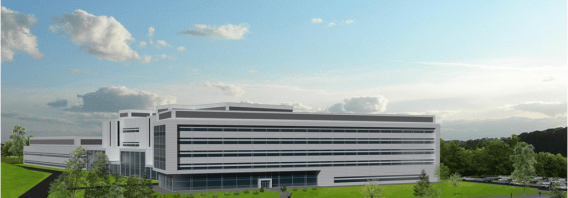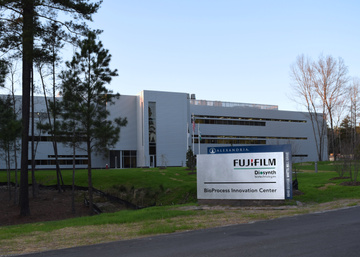
FUJIFILM Picks NC for $2B, 725-Employee Biomanufacturing Site

North Carolina wins.
FUJIFILM Corporation today ended a high-stakes economic development drama by announcing that Holly Springs, N.C., is officially its choice for siting a huge $2 billion biomanufacturing site, investing at least $1.5 billion of that by the end of 2024.
The decision will add 725 more jobs to the region’s globally leading cell- and gene-therapy manufacturing workforce with an average salary just under $100,000 a year. Upon completion of the initial phase,, the company says it will be the largest end-to-end cell culture production facility in North America. It’s also the largest single life sciences investment in the state's four-decade history of growing the sector.
It caps a search process publicly announced in early January that spanned the United States to accelerate the growth of the Japanese conglomerate’s biopharmaceutical contract development and manufacturing (CDMO) business.
CDMO refers to companies offering services to pharmaceutical companies such as cell-line and process development, stability testing, the development and manufacturing of clinical-trial drugs as well as commercial drug manufacturing.

FUJIFILM Diosynth Biotechnologies (FDB), a Morrisville-based subsidiary of the FUJIFILM Corporation, of Tokyo, will operate the new facility. FDB is an industry-leading CDMO with other locations in College Station, Texas; Teesside, England; Hillerød, Denmark; and a soon-to-open facility in the Boston suburb of Watertown.
When the parent company announced plans for the new facility early this year, it said it would locate the new FDB facility in the vicinity of an existing U.S. FUJIFILM site, though not necessarily near its FDB biotech facilities. That left some 25 communities nationwide vying for the factory with a range of financial incentives and other competitive pitches. The final decision left North Carolina edging out Texas.
Talent, business climate, collaboration, diversity are NC assets
“Identifying a place to locate a biomanufacturing project of this magnitude hinges on the availability of highly trained people, a top-notch business climate, and a hyper-collaborative ecosystem, all within a strong, diverse life sciences cluster. And that place is North Carolina,” said Bill Bullock, senior vice president of economic development and statewide operations with the North Carolina Biotechnology Center. NCBiotech provided technical and other support to the state’s recruitment team.
“Holly Springs in particular is a model community in how to develop and implement a long-term strategy to attract life science jobs and investment, going back to Novartis’ decision to locate its vaccine campus there in 2006.”

The Novartis Vaccines facility was sold to Seqirus, which produces flu vaccines from cell culture at the Holly Springs factory.
Partners collaborating on the recruitment project, besides NCBiotech, include the General Assembly, the Economic Development Partnership of North Carolina, the North Carolina Department of Commerce, the Town of Holly Springs, Wake Tech and the North Carolina Community College System/BioNetwork, North Carolina State University and its Golden LEAF Biomanufacturing Training and Education Center, and North Carolina Centra University and its Biomanufacturing Research Institute and Technology Enterprise, the North Carolina Department of Transportation, the North Carolina Department of Environmental Quality, Duke Energy, The UNC System Office, the University of North Carolina at Chapel Hill, Duke University, the North Carolina Japan Center, Capital Area Workforce Development, Wake County, and Wake County Economic Development, a program of the Raleigh Chamber.
"Today’s decision shows once again that North Carolina is a world-class location for the most innovative biotech companies in the industry,” said Governor Roy Cooper in a statement announcing the win. “Since FUJIFILM Diosynth Biotechnologies already operates a facility in our state, they have complete confidence this new plant will succeed as well, thanks to North Carolina’s skilled workers, our commitment to workforce training, and the growing strength of our life science industrial cluster.”
The company said when its new facility begins operations in the spring of 2025 it will conduct large-scale cell culture manufacturing of bulk drug substance using eight 20,000-liter (5,283-gallon) bioreactors for growing mammalian cells. Plans for the site include the potential to expand and add up to 24 more of those bioreactors, based on market demand.
In addition to drug substance manufacture, the facility will also provide commercial-scale, fully automated fill-finish and assembly of a variety of syringes, and equipment for automatic packaging and labeling.
Social, climate issues are being embraced
The square footage of the Holly Springs facility is not yet determined, but it’s being designed and built with sustainability as its core. The design targets 100% clean energy utilization, and implementation of cutting-edge waste disposal and recycling, among other sustainability goals.

“Holly Springs, North Carolina is a suitable location for us, as it is one of the most active communities in the U.S. in addressing environmental and social issues,” said Kenji Sukeno, president of FUJIFILM Corporation. “Fujifilm will contribute to realizing a sustainable society by collaborating with the Holly Springs community and stimulating the local economy, and further, by accelerating “resolving social issues through business activities” in alignment with our Sustainable Value Plan 2030*. And, the new site is strategically important to accelerate the growth of our Bio CDMO business.”
Sustainable Value Plan 2030 is the company’s environmental, social and governance plan, to be achieved by FY2031/Q3. It addresses four key areas: the environment, health, daily life and work style. The company is committed to “considering environmental and social impacts through business processes” and “resolving social issues through business activities.” The environmental plan sets numerical targets including “a 45% reduction in the volume of CO2 emitted across the entire product lifecycle compared to FY2014/Q3.”
FUJIFILM is actively investing to enhance and grow its end-to-end service offerings across all of its biologics CDMO sites, which the company has named its “Bio CDMO division.” In June 2020, it invested $928 million in FDB’s Denmark site to double its large-scale cell culture manufacturing capacity and add commercial-scale drug product production capabilities.
Company cites strong community support for decision
“We are passionate about the tremendous value that this new facility will bring to our partners in producing life-impacting therapies. To build what will be the largest end-to-end cell culture CDMO facility in North America requires commitment and partnership. We are delighted to have received the strong support from the town of Holly Springs and the state of North Carolina. This is building for the future, both in infrastructure and in talent, as part of the vibrant North Carolina biotech hub,” said Martin Meeson, Morrisville-based CEO of FDB.
The 600+ employees at the company’s expanding Morrisville facility, established in 1996, produce more than 60 products. In July 2020 it partnered with Novavax to help produce that company’s COVID-19 vaccine, which is awaiting final marketing approval from the U.S. Food and Drug Administration. That campus includes three buildings that house the company’s process development and analytical laboratories, a cGMP manufacturing facility, and an administration headquarters.
FUJIFILM's story of end-to-end development is right at home in North Carolina, where partners across many organizations collaborate to take ideas from university research to startup company, through the rocky road of product development to manufacturing and distributing the final product. FDB's gene therapy production capacity joins a cluster of companies making their cell- and gene-therapy products here. Since 2017, 10 companies announced $1.4 billion in facilities investments in North Carolina.
Reinforces NC's global reputation for life sciences leadership
North Carolina is known globally as a magnet for biopharmaceutical manufacturing. In August 2015 the Danish giant Novo Nordisk announced a five-year plan to invest up to $1.7 billion and create approximately 700 jobs at a new biomanufacturing facility in Johnston County, doubling its then-existing workforce in the state. In October 2020 BioAgilytix, one of North Carolina’s fastest-growing home-grown life sciences companies, unveiled plans to add 878 new employees to its workforce of 425, with a $61.5 million investment in its global Durham headquarters. The privately held company provides contract services to pharmaceutical and biotech companies internationally.
To help grow North Carolina’s globally recognized biomanufacturing workforce, NCBiotech recently launched a unique recruitment program called Bio Jobs Hub, especially targeting people without advanced degrees who may not realize they could qualify for excellent career opportunities in the field.
Statewide, North Carolina currently has 775 life sciences companies employing more than 67,000 people. The state is globally recognized for its workforce training system, ranging from specialized courses for graduating high school students through world-class universities providing graduate programs in cutting-edge scientific disciplines.
The state is not only the birthplace and global epicenter of the contract research and testing industry, but also a renowned hub of biomanufacturing, with 130 companies employing 27,000 people, including national leadership in the kind of biological product manufacturing done by FDB. Today’s announcement is expected to increase North Carolina’s visibility as a leading site for moving technology from its inception as an idea through every phase of development and into the marketplace.
Exciting opportunity for NC's new Commerce secretary Machelle Sanders
“As a former executive in the life sciences sector, I’ve never seen a more exciting and promising time for this critical North Carolina industry,” said North Carolina Commerce Secretary Machelle Baker Sanders. “As companies like FUJIFILM Diosynth Biotechnologies embrace innovation to support the delivery of new medicines in development by its customers, North Carolina must also embrace innovation to discover new ways to develop the skilled and diverse workforce 21st century companies need to thrive.”
The state is providing incentives that include a Job Development Investment Grant (JDIG) approved by the state’s Economic Investment Committee earlier today. Over the course of the 12-year term of this grant, the project is estimated to grow the state’s economy by $5.5 billion. Using a formula that anticipates the new tax revenues generated by the new jobs, the JDIG agreement authorizes the potential reimbursement to the company of about $20 million, spread over 12 years, based on a required capital investment of $1.5 billion. Over those 12 years, new state tax revenues generated by the new jobs will exceed $160 million.
The JDIG agreement could also move nearly $6.6 million into a fund that helps rural communities across the state attract business in the future. When companies select a site located in a Tier 3 county such as Wake, their JDIG agreements move some of the new tax revenue into the state’s Industrial Development Fund – Utility Account. Local communities in more economically challenged areas of the state use grants from the Utility Account to build public infrastructure projects, which can improve a community’s ability to attract companies to their regions.
FDB was also awarded a grant of $2 million today from the state’s One North Carolina Fund.
FUJIFILM has set a target to achieve an annual revenue of some $200 billion for its Bio CDMO business by fiscal year ending March 2025. Beyond the fiscal year ending March 2026, the company expects this latest investment to boost the annual growth rate of its Bio CDMO business to 20%, greatly exceeding market projections.
About FUJIFILM Corp.
FUJIFILM Corporation is an operating company of FUJIFILM Holdings Corporation. It brings cutting-edge solutions to a broad range of global industries including healthcare, graphic systems, highly functional materials, optical devices, digital imaging and document products. These products and services are based on its extensive portfolio of chemical, mechanical, optical, electronic and imaging technologies. For the year ended March 31, 2020, the company had global revenues of $21 billion, at an exchange rate of 109 yen to the dollar.
About FUJIFILM Diosynth Biotechnologies
FDB has over 30 years of experience in the development and manufacturing of recombinant proteins, vaccines, monoclonal antibodies, among other large molecules, viral products and medical countermeasures expressed in a wide array of microbial, mammalian, and host/virus systems. The company offers a comprehensive list of services from cell-line development using its proprietary pAVEway microbial and Apollo X cell-line systems to process development, analytical development, clinical and FDA-approved commercial manufacturing. FDB is a partnership between FUJIFILM Corporation and Mitsubishi Corporation.
